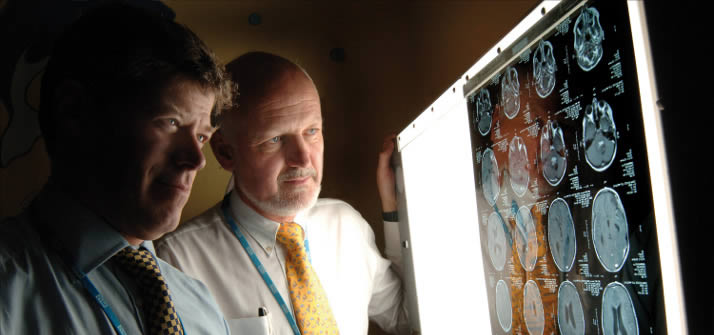Parents urged to be brain tumour aware
June 2nd, 2011
A new campaign has been launched to help parents and health professionals to spot the signs of brain tumours in children and young people. HeadSmart is being piloted in the East Midlands and aims to speed up diagnosis rates and raise awareness of brain tumour symptoms.
Pam Hunt from Blaby in Leicestershire visited the doctor several times with her eight-year-old son Ryan before he was diagnosed with a brain tumour after a local optician spotted symptoms during an eye test.
Pam said: “I’d taken Ryan to the GP because he was suffering from regular headaches. On its own, this symptom might not have indicated a brain tumour, but it was the pattern of this and other symptoms he developed which was important.”
“Parents and carers should not panic, but they do know their children better than anyone else. If you’re concerned then get them seen by a doctor, and take them back if necessary. At best, it will turn out to be nothing, in which case you gain peace of mind — if it is a brain tumour then early diagnosis may save your child’s life.”
Around 500 children and young people a year are diagnosed with a brain tumour — nearly 10 a week — and a quarter of all child cancers occur in the brain. Survival rates have improved over the past 20 years but brain tumours remain the leading cause of cancer deaths in children.
The symptoms of a brain tumour can often be similar to those of other illnesses; as a result they are frequently mistaken for less serious conditions. It can take up to three months for a child to be diagnosed in the UK — three times longer than in the United States and Canada. Delays in diagnosis contribute to a higher death rate and lifelong disability, which child brain tumour survivors are 10 times more likely to suffer from.
HeadSmart is a new joint campaign by the Children’s Brain Tumour Research Centre at The University of Nottingham, the Royal College of Paediatrics and Child Health (RCPCH) and the Samantha Dickson Brain Tumour Trust that aims to raise awareness of brain tumour symptoms by helping parents and health professionals spot the signs of brain tumours in children and young people.
To do this the HeadSmart campaign has launched a range of resources, including a new website, leaflets and a pocket-sized ‘symptoms card’. These provide information for doctors, parents, carers and young people about how to spot the signs of a possible brain tumour. The HeadSmart campaign is a national initiative but is being evaluated in the East Midlands.
Professor David Walker, Professor of Paediatric Oncology at the Children’s Brain Tumour Research Centre, said: “Brain tumours are fortunately rare, but they do happen, and it can be difficult for doctors to diagnose because the symptoms can often mimic less serious illnesses. Parents have no need to worry if their child occasionally experiences headaches, for example, but if symptoms come back frequently or are present for two weeks or more, see your family doctor.
“The most important thing is that parents and family doctors know the symptoms of child brain tumours and make sure that possible cases are diagnosed as quickly as possible.”
Founder of the Samantha Dickson Brain Tumour Trust, Neil Dickson, said: “Having taken nine months for our own daughter to be diagnosed with a brain tumour, and receiving many calls from parents who experienced similar delays, we strongly believe that more should be done to reduce the time taken for a diagnosis, and that is why Samantha Dickson Brain Tumour Trust is a partner in the HeadSmart Campaign.
“Tragically this comes too late for Samantha, but by increasing the awareness of symptoms among parents and healthcare professionals, it doesn’t need to be too late for others.”
Dr Jan Dudley, Chair of the RCPCH Clinical Standards Committee, Executive of HeadSmart project board, said: “The UK lags behind other developed countries in the time taken for brain tumours to be diagnosed. The HeadSmart campaign aim of increasing public and professional awareness of brain tumours in children is crucial in addressing this imbalance.”
To read a comment piece from Dr Walker, click here. And to find out more visit www.headsmart.org.uk.
Tags: CBTRC, Children’s Brain Tumour Research Centre (CBTRC), HeadSmart, Professor David Walker, Royal College of Paediatrics and Child Health (RCPCH), Samantha Dickson Brain Tumour Trust
Leave a Reply
Other News

Need news? See you on SharePoint
After 14 years of service, Campus News is being retired as the university’s staff news platform. […]

Roads and car parks closed for refurbishing work
As part of ongoing road improvements at the university, works will be taking place to resurface […]


